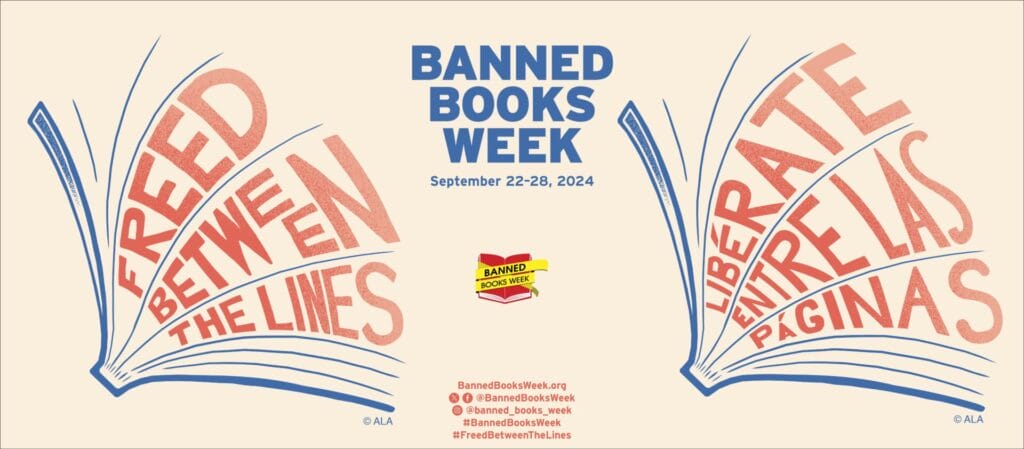Banned Books Week (BBW) kicks off this year with new data showing the number of book banning attempts down, but still at high levels, and that efforts to restrict access to books and other “soft censorship” are up.
“Titles representing the voices and lived experiences of LGBTQIA+ and [Black, Indigenous and other People of Color] individuals made up 47% of those targeted in censorship attempts,” the American Library Association reported this morning.
Launched in 1982, Banned Books Week highlights the importance of free speech and access to diverse books, and unites librarians, educators, students, authors, and more in supporting the right to read.
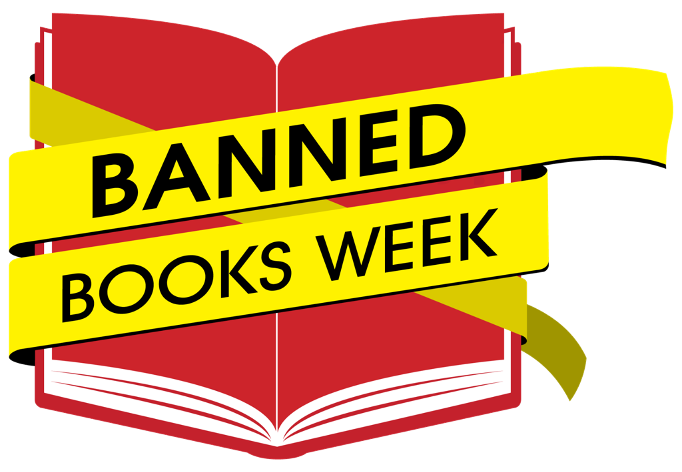
The theme of this year’s Banned Books Week is “Freed Between the Lines.” Headlining the week is award-winning filmmaker Ava DuVernay, selected as honorary chair of Banned Books Week. DuVernay, whose credits include Selma, 13th, Queen Sugar, and When They See Us, is an Academy Award nominee, and was honored with the GLAAD Excellence in Media Award in 2018.

“I believe that censorship is the enemy of freedom,” said DuVernay. “By banning books, we deny ourselves the opportunity to learn from the past and to envision a braver future. Books have the power to open minds and build bridges. This is why certain forces do not want the masses to engage with books. They fear progress and growth in new, bold directions. For this reason, Banned Books Week is vitally important. It is a celebration of our right to access varied voices and to engage with ideas that challenge and champion us. I am honored to be selected as honorary chair of Banned Book Week for this election year, and I stand with my fellow readers, fellow writers and fellow advocates around the world who refuse to let voices be silenced.”
Banned Books Week selected student activist Julia Garnett as youth honorary chair. Concerned by the erosion of rights in her home state of Tennessee, Garnett formed a free speech club at her high school. Garnett and several young advocates were recognized for their advocacy efforts last October at a White House event.
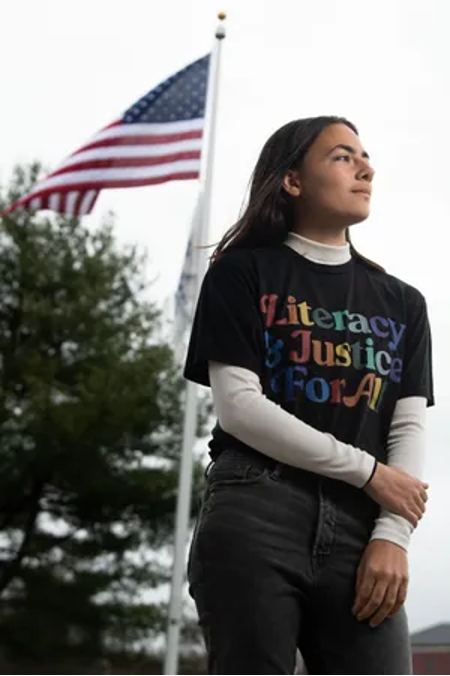
GLAAD is elevating LGBTQ authors during Banned Books Week, including an interview with author and illustrator Paul Castle, whose book The Secret Ingredient, about families and adoption, was targeted during Pride month this year. Castle and his husband Matthew explained why they wanted to write the book and how the community rallied to their defense.
“Kids nowadays really need to see that kind of representation,” Castle told GLAAD , “whether or not they have that sort of family or their friends do, it’s just more and more common, so I think that that needs to be reflected in the literature that kids are consuming, as well, from a young age.”
An exhaustive fight against exhausting book bans
Newly released data from the American Library Association (ALA) Office for Intellectual Freedom shows that, while the number of book ban attempts in public, school, and academic libraries saw an overall drop, “the number of documented attempts to censor books continues to far exceed the numbers prior to 2020.” According to their research, Jan. 1 – Aug. 31, 2024 saw 414 attempts to ban books and limit access to library services. These attempts encompass 1,128 unique titles.
ALA also notes that “soft censorship,” which includes moving books to age-restricted sections, hiding them, or other methods of limiting book access, “illustrate the impact of organized censorship campaigns on students’ and readers’ freedom to read.”
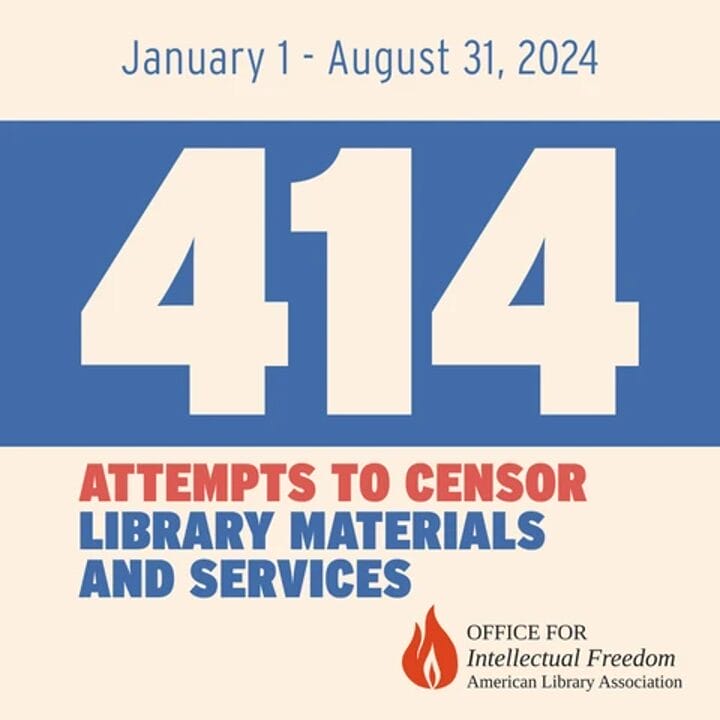
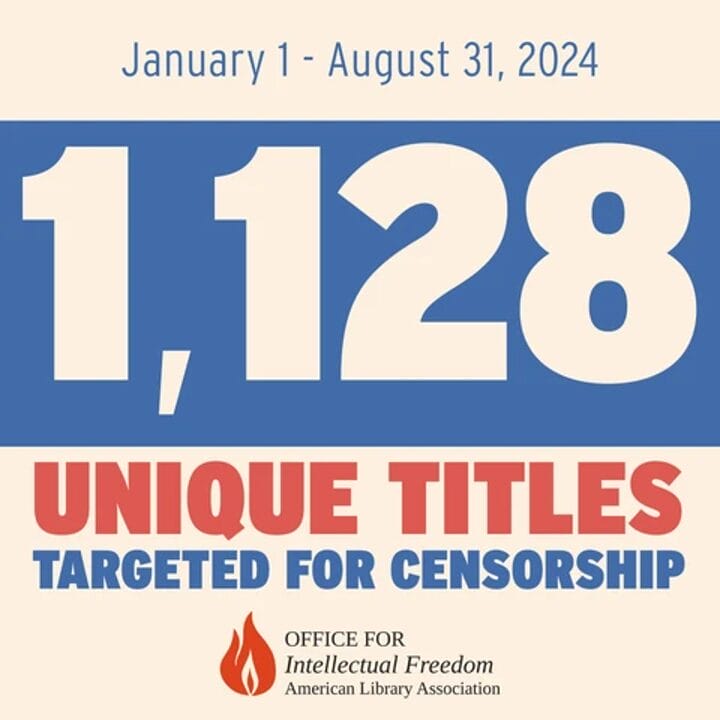
Meanwhile, preliminary data from PEN America reported more than 10,000 instances of book bans in public schools over the course of the 2023-24 school year – nearly tripling that of 2022-23 (3,362).
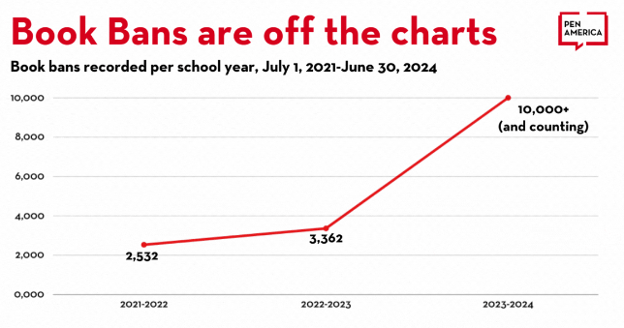
A deeper dive finds that 8,000 of these book bans took place in Florida and Iowa, both of which have implemented strict laws mandating the removal of titles that fail to meet a narrow interpretation of “age appropriate.”
Mass book bans (100 or more titles targeted by a single person) are increasingly common, and the ways so-called “parents’ rights” groups like Moms for Liberty are boosting them are coming to light. Book Riot’s Kelly Jensen said that “the emergence of social media and engagement algorithms” have been instrumental in the book ban movement.
“Imagine that you know nothing about what’s going on, but you’ve heard the words ‘book ban’ buzzing around,” Jensen continued. “So you go online to look up what’s going on, and you’re presented [sic] a post about so-called inappropriate books in your local public schools or libraries. That link takes you to a Moms for Liberty group or some other local far-right political organization—and then the algorithms kick in and begin serving you up a steady stream of similar content in your feed.”
While voters and communities are rejecting Moms for Liberty’s (M4L) efforts and candidates, a fringe few inaccurately described “parents’ rights” activists turn to BookLooks, a review site that tells book banners which titles to target.
Other concerning developments include:
- the closure or threat of closure of school and public libraries to meet compliance with censorship laws or due to lack of funding.
- forcing libraries to move books with the vague label of “obscene content” to an “adults only” section or close the library altogether to avoid a lawsuit.
- voting to fire school and library board members who don’t align themselves with book ban efforts, and labeling those who disagree or don’t comply as “groomers.”
- harassment, cyberbullying, and even death threats against librarians.
- firing educators who push back against book bans, and even going so far as to revoke their teaching licenses.
- spamming book ban requests. Angelina Davenport, former vice chair of M4L’s Berkeley County, South Carolina chapter and a candidate for school board, submitted a list of 93 books she wanted removed, citing SC 16-15-30, the state’s obscenity law. More recently, the South Carolina Department of Education implemented strict new book ban guidelines ahead of the 2023-24 school year, using vague language like “age appropriate” to establish a blanket book ban against titles with “descriptions or visual depictions of ‘sexual conduct.’” In Wisconsin, one parent in the Elkhorn Area District flagged 444 books for review and removal. These efforts have overwhelmed educators and librarians, and have led intellectual freedom advocates to begin tracking such efforts to highlight the book ban epidemic.
- blanket book bans, such as those implemented in Iowa, have resulted in the removal of thousands of LGBTQ titles, and prohibited educators from discussing gender identity and sexual orientation in the classroom.
- attempting to ban books in Oklahoma schools while also requiring that the Bible be taught in the classroom.
- a formerly progressive college in Florida disposing of hundreds of titles, including LGBTQ books, from their dismantled Gender and Diversity Center.
- targeting an LGBTQ manga (Japanese comic book) series based in part on the way it’s read (right to left). In its place, the involved school board recommended Chainsaw Man, an extremely violent manga series, among its list of alternative titles.
Banned book resources
GLAAD has compiled a list of resources to help you fight book bans this Banned Books Week and beyond:
- Book Bans: A Guide for Community Response and Action (GLAAD): A toolkit to inform and prepare community members to organize, create authentic messages, and work with media to ensure diverse local voices are heard against book bans and in support of LGBTQ people and all people of color.
- Banned & Challenged Books (American Library Association): Discover book ban stats, learn about the most challenged books of 2023, and gain access to free resources, including book résumés.
- Banned Books Map (Little Free Library): Created in collaboration with data from PEN America and The American Library Association Office for Intellectual Freedom, this map will show you where book bans are happening in your community, as well as the locations of Little Free Library (LFL) boxes. LFL Director of Communications Margret Aldrich said she hopes the “Book Ban Map brings further awareness to the issue of book censorship and drives it home that book bans aren’t only happening in hotspots like Florida and Texas—they could be happening in your state.”
- Book Censorship Action Kit (National Coalition Against Censorship): Geared toward educators, parents, students, and authors, this toolkit explores the types of books that are most frequently banned, why they’re targeted, and ways to take action.
- Book Ban Resources (PEN America): Discover book ban stats, report book bans, and learn how to fight back.
- Read With Love (PFLAG): Purchase a book through PFLAG National’s #ReadWithLove Bookshop.org bookshelf, and donate it to your local library, learn how to take action against book bans, or how to host a “Read With Love-In.”
- Action Toolkit (Unite Against Book Bans): Learn how you can work with your community to fight book bans. This resource includes answers to commonly asked book ban questions, information about attending school and library board meetings, reaching out to the media, and more!
Banned Books Week events
On Tuesday, September 24 at 2 pm ET, Banned Books Week Honorary Chair Ava DuVernay and Youth Chair Julia Garnett will hold a conversation on the ALA’s YouTube channel. In addition, on Friday, September 27 at 5 pm ET, Garnett and freedom to read advocates from several organizations will participate in Leading Change: Youth Fighting Book Bans, an inspiring virtual discussion about why and how students are taking action against book bans and censorship. The webinar is free with registration.
Banned Books Week Coalition members and other right-to-read-supporting organizations will also be holding events throughout the week:
- The ALA is hosting several events, including: a webinar to help library boards and trustees advocate for the freedom to read; an exploration of queer comics, including graphic novels and manga; a webinar that provides actionable items on how to organize and fight back against books bans, and more!
- Banned Wagon Tour (Penguin Random House, Unite Against Book Bans, First Book, and Little Free Library): Starting with Banned Books Week and extending through October 15, The Banned Wagon will make stops in communities that have been heavily impacted by book bans. Stop by and grab a copy of one of 20 banned books while supplies last!
- PEN America will be hosting events all throughout the week, many of which are free! Visit their Banned Books Week 2024 portal to learn more and register.
- Visit the Banned Books Week website to explore BBW events around the country. Organizations, libraries, bookstores, theaters, authors, and more have planned engaging and informative programming in celebration of the right to read. In addition, check your local newspaper listings for more Banned Books Week-related events.
Let freedom read!
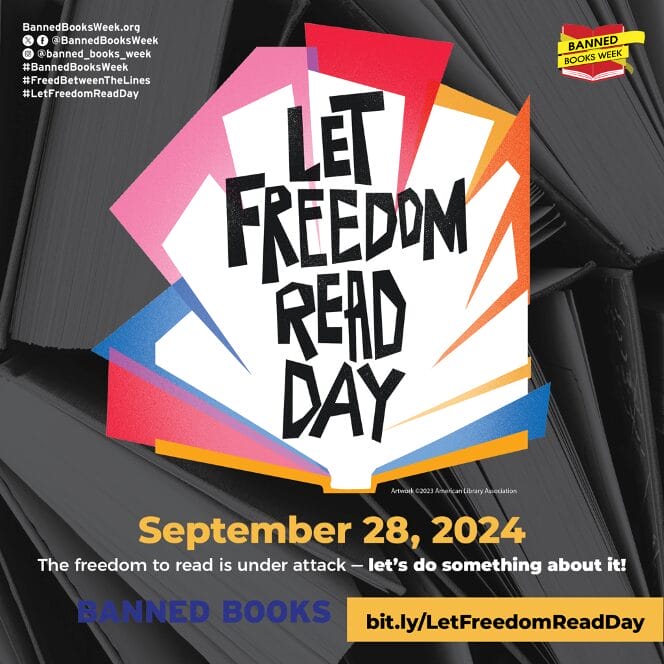
Once again bookending this year’s Banned Books Week is Let Freedom Read Day, on Saturday, September 28. A day of action, Let Freedom Read Day will help you rethink what it means to get involved. Whether you have five minutes, an hour, or more, your participation on Let Freedom Read Day (and beyond!) is key to defeating book bans.
Every action matters. What will yours be?

